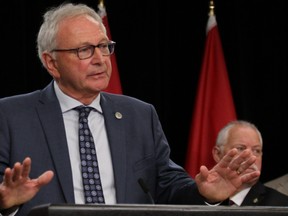Ben Eisen and Alex Whalen: NBers reap rewards of Higgs spending restraint
Through a mix of spending restraint, balanced budgets and debt reduction, New Brunswick's fiscal position has substantially improved in recent years

Article content
The Higgs government in New Brunswick has exercised spending restraint while its regional neighbours have spent much more freely. The government’s discipline has helped greatly improve the province’s finances, creating fiscal room for tax cuts.
But, first, it’s important to fully understand New Brunswick’s fiscal position.
In recent years, governments in the Maritimes have enjoyed an unexpected revenue surge thanks largely to increased transfers from the federal government. As a result, the heavily indebted provincial governments in the region have had an opportunity to get their finances back on track.
Unfortunately, provincial governments in Nova Scotia and Prince Edward Island have failed to seize this opportunity and instead increased spending to offset recent revenue gains. New Brunswick, however, has taken a markedly different approach. Instead of spending the new revenue, the Higgs government has essentially held spending flat, causing surpluses to emerge and the province’s debt burden to shrink quickly.
More specifically, this year the province will deliver its seventh consecutive balanced budget (five under Higgs and two under his predecessor Brian Gallant). Provincial debt has shrunk by more than $2 billion between 2019/20 and the current year. Debt relative to the size of the economy is now as low as it’s been at any point since 1991.
Again, comparisons to other provinces put this progress into perspective. Only a few years ago, New Brunswick had the largest debt burden relative to the size of its economy in the Maritimes. Today, it has the lowest debt burden in the region, with even more progress expected in the future. Meanwhile, Nova Scotia and P.E.I. are piling up debt.
These fiscal improvements are already directly benefiting New Brunswickers. First, the province pays upwards of $600 million per year on debt interest – money unavailable for other priorities such as reducing taxes or improving services. But spending restraint, balanced budgets and debt reduction mean these payments are lower now than they otherwise would be, freeing up money for better uses.
Secondly, as noted in a recent study published by the Fraser Institute, the province has the opportunity to reduce taxes immediately without going into deficit. While this year’s budget did include modest personal income tax relief, if revenue and spending trends from recent years continue, the province can create room for $3,604 per year in income tax relief per-tax filer within a decade.
Through a mix of spending restraint, balanced budgets and debt reduction, New Brunswick’s fiscal position has substantially improved in recent years. New Brunswickers have already benefitted through lower government debt interest payments and modest tax relief, and if the government stays fiscally disciplined, there could be more to come.
Ben Eisen and Alex Whalen are economists at the Fraser Institute.











Postmedia is committed to maintaining a lively but civil forum for discussion. Please keep comments relevant and respectful. Comments may take up to an hour to appear on the site. You will receive an email if there is a reply to your comment, an update to a thread you follow or if a user you follow comments. Visit our Community Guidelines for more information.